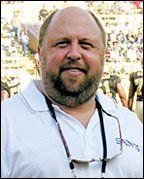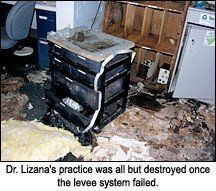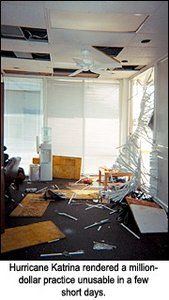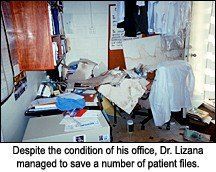It’s a new year and many chiropractors are evaluating what will enhance their respective practices, particularly as it relates to their bottom line. One of the most common questions I get is: “Do I need to be credentialed to bill insurance, and what are the best plans to join?” It’s a loaded question – but one every DC ponders. Whether you're already in-network or pondering whether to join, here's what you need to know.
Chiropractic in the Eye of the Storm
In the Feb. 13 issue, Dr. Robert Lizana described in graphic detail what it was like to be at the center of Hurricane Katrina. In part two of this exclusive interview, Dr. Lizana offers a few words of advice and encouragement to his fellow DCs along the Gulf Coast, and suggests how chiropractors nationwide can help their colleagues whose lives have been forever changed.
Dynamic Chiropractic (DC): From what we understand, you had a thriving practice before the hurricane - you even had a few other chiropractors on staff. What is the status of your practice now?

Robert Lizana (RL): I had 19 staff members total - three chiropractors, two part-time medical doctors, and 14 full- and part-time support staff. We had a million-dollar-a-year practice that was wiped out in a day, along with most of the city. Most of them had to relocate. For the first month, I could not get in touch with nearly anyone because of the phone systems being down. Since then, I have been in touch with most of them; many are living in different cities and other states. I now have one full-time and one part-time staff member working with me.

The last patients I adjusted in my clinic came in on Saturday morning. The Saints played Friday night in the Superdome. I went with my son; we were on the field and it was great. The next morning, I took care of some players at my office. While I was treating [Saints quarterback] Aaron Brooks, who had 82 consecutive starts - and he attributes his longevity to chiropractic care - two coaches from our team called to reschedule their appointments because they had been summoned immediately to the facility for a hurricane briefing. Aaron and I just looked at each other and I jokingly said, "I hope we all don't have waterfront property when we get back!" That was the end of the visit. He left, I left, and that was the last person I worked on in my office.
Twenty-one years in that office, over 12,000 patients and hundreds of thousands of adjustments delivered, and he was the last one. I told my wife that at least we went out on top. It was a very dramatic end to a wonderful office.
DC: We understand that several hundred chiropractors have been affected.
RL: Yes, the reason I am doing this interview is to bring awareness to what has happened to the chiropractic community down here. There are more than 170 chiropractors who have experienced various degrees of loss. Some of them may have had mild losses and may have been out of electricity for a few weeks; many lost their practices completely. Some of these DCs also lost their homes. One doctor lost three practices and his home. When you add the victims of hurricane Rita to the count, the Chiropractic Association of Louisiana estimates that 250 chiropractors were affected in the Louisiana area alone. That is 250 out of 500 licensed chiropractors - 50 percent of our profession, with dozens of those practitioners drastically affected.
What we have done to survive professionally is band together in certain offices that weren't badly damaged. Many chiropractors have opened their homes and their practices to help their fellow colleagues out. Dr. Gerry Provance has invited displaced chiropractors to practice in his clinic, even though his home and office sustained damage. And then there's Dr. Harold Ehrenberg, whose office I'm in now. He invited five chiropractors to use his facility. All five are now practicing out of his office. We five chiropractors represented probably eight clinics before the hurricane. We're now practicing in about 1,650 square feet. Collectively, before the hurricane, we were practicing in clinics that represented about 20,000 square feet. My office alone was 5,500 square feet.
DC: It must be pretty tight in there.
RL: It's tight all right, and many of the doctors are very anxious about their uncertain future. Many of these guys had been practicing for 20 to 25 years and were well-established in their communities. Now their communities are gone. It's difficult for them to find out how many of their patients are coming back and it's difficult for the patients to find out where the [chiropractors] are. All landmarks and reference points are gone. The hurricanes were not only powerful, but also enormous, covering nearly 300 miles of coastline from Mississippi thru Louisiana. And the population in New Orleans went from 485,000 people before the hurricanes to 70,000 afterward. In St. Bernard, a suburb of New Orleans, the population went from 68,000 down to 3,000 after the hurricane. In Waveland, Miss, the population went from 8,000 down to 1,300 after the hurricane. It is just devastating for the chiropractors and the other doctors who are trying to re-establish themselves, while at the same time dealing with the insurance companies and their delay tactics.
DC: What has the state association been doing?
RL: The Chiropractic Association of Louisiana (CAL) has been great. They set up a tax-deductible fund, a 501(c)(3) plan. This allows for manufacturers, chiropractic state associations, national associations, and individual chiropractors to contribute to the CAL Relief Fund. Any Louisiana chiropractor affected by the hurricanes can apply for assistance. All applications are reviewed by a three-member committee. With the exception of the startup cost to set up the relief fund, 100 percent of the donations will be used entirely to help the affected chiropractors. There are no expenses for the ongoing management of this fund.
I'd like to thank all of the organizations and individuals, especially the ICA, for their contributions to the CAL Relief Fund. I'd personally like to thank Hessco and Erchonia for donating equipment; Dr. Jimmy for donating Total Shake; Dr. David Singer, who has given consulting and advice at no charge; and the Professional Football Chiropractic Society, the National Football League and the New Orleans Saints organization. Again, these are the ones I personally know about and I want to thank and acknowledge them, along with the many friends of chiropractic who called and e-mailed me with concern and offers of help.
I would like to especially thank Dynamic Chiropractic for publishing this article, thereby raising awareness and generating help for those of us in need. Someone recently handed me an issue of Dynamic Chiropractic, dated Oct. 24, 2005, wherein Donald Petersen wrote an article called, "Doctors in Need: We Can Help!" It's an excellent article; he gets it right and I thank him for it. There is another issue of DC that was handed to me (I don't get mail yet) and this one's dated Nov. 7, 2005, in which Foot Levelers President, Kent Greenawalt, gave the Red Cross $564,000 for hurricane victims. They initiated an ambitious "dollar-for-dollar matching campaign" and donated the money to the Red Cross. I'd like to acknowledge their quick response and generosity for helping. What I'd like to point out is, the chiropractic profession, as a whole, was severely damaged in this region and could use some help. It's not like we can walk up to the Red Cross and the Government as a chiropractic group and ask for funds. We need to rely on our colleagues, manufacturers, and state and national organizations to help us.
I would like to relay my experience with the Red Cross. As a chiropractor who was there from day one of the hurricane, working at the largest police command center in Metairie and volunteering just about daily for the first four weeks, neither I nor the police or National Guard that I was working with ever saw the Red Cross once. Every day, the policemen would come up to me and ask, "Has the Red Cross come here yet? They told us that they would be here today to help us." The first time I saw the Red Cross throughout this whole ordeal was about four weeks after the hurricane, in San Antonio, while staying at a hotel the players had put me up at. The place was packed with Red Cross people. I asked them if there was a Red Cross convention there. They told me "no," and that they were there to help the victims of the hurricane. I told them they were about 550 miles away from the people who needed help.

Have you ever personally had to receive help from the Red Cross? I have. Now my experience with the individual volunteer is good. They are very sincere and compassionate. I do, however, have questions about their management and handling of funds. From what I heard on the radio, Congress also has these concerns about the Red Cross and is looking into the matter. There are some things I would like to acknowledge the Red Cross for: They make really good commercials; their volunteers stay at nice hotels; and they pay optometrists $1,500 a day for their services. I don't know of any chiropractors ever paid by the Red Cross for their services. I am sure the Red Cross does good works and helps a lot of people. They were probably overwhelmed by the magnitude of the help that was needed in this crisis.
I've called Kent Greenawalt on several occasions to tell him the chiropractic story here, but I haven't had any success in reaching him personally. I was informed by his secretary on one of my calls that Foot Levelers was no longer collecting funds or helping out on this particular tragedy. I'd certainly like them to reconsider their decision and initiate another matching-fund endeavor, along with all the other manufacturers, and this time make it on the behalf of chiropractic in the Gulf Coast region.

The president has visited this area nine times and the NFL commissioner has been here six times to see the devastation firsthand and lend their support. People who visit here are moved by what they see and want to help not only because of the magnitude of the destruction but also by the enormous amount of people and territory that has been affected. That's why I'd be more than happy to buy plane tickets to New Orleans for any manufacturers, state association representatives or national association representatives - I will personally pick them up at the airport, drive them around the city, show them where clinics used to be and enlighten them on the situation. I'll do this so that my fellow chiropractors devastated in this region can get the proper help. I know with certainty that chiropractors are very caring and giving people. And once they truly realize the amount of devastation, they will gladly help, just as we Louisianans have helped others in their time of need. We have one of the smallest populations, and a lot of poverty here. I was told that when it came to the 9/11 tragedy in New York City that we were ranked the third most giving state in the country. We may laugh too loud and drink too much down here, but we are very caring and giving. So I am asking chiropractors in other states, "Will you help us now in our time of need?"
DC: The football season ended Jan. 1. What does the future hold for you now? Are you going to return to New Orleans?
RL: I'll return to New Orleans and what I'll do is continue my work with the Saints organization. I also treat the Triple-A baseball players here and I'm well established in the sports community. So, caring for these groups will keep me very busy.
I'm not worried about my personal future. I know what I am capable of creating, as far as a practice goes. What I am more concerned about here, and why I'm glad to do this interview, is bringing awareness to the awful plight that so many chiropractors are faced with, which affects the viability of chiropractic in this region. So, it's more a question of what the future holds for chiropractic in New Orleans and the Gulf Coast region. So many practices and chiropractors have been wiped out. How can we go about getting chiropractic re-established and having even more of a presence here and throughout the entire Gulf Coast region? My answer is by helping the individual chiropractors get going again.
What I see myself doing is creating another office, but a different type of office in which there can be many individual chiropractors having a facility available to them so that they can start to reclaim their lives and begin to rebuild their practices again. This will need funding.
It's been almost six months now, and there is still a lot of confusion and uncertainty about the future for many chiropractors, and thus, the future of chiropractic in this region. It will take them awhile to re-establish themselves and find their patients. I don't know how many doctors left the Gulf Coast region and just aren't coming back. I don't blame them. It's rough down here. This is no small task; it will take years and a lot of energy and support to get things going again. Meanwhile, it would be helpful to the survival of the displaced chiropractors and their families if other states would follow Texas' lead by giving displaced doctors reciprocity. Other professions have stepped up, such as state bar associations who have given reciprocity to lawyers from Louisiana, and the American Optometric Association, which convinced state boards to give displaced optometrists from Louisiana reciprocity with their state.
DC: If there was one thing you could say to your fellow chiropractors, not just in Louisiana and Mississippi, but nationwide, to make them more aware of what's going on, what would you say to get people more involved?
RL: I would tell them that what we are going through is a complete nightmare and that I wish no one else in our profession will ever have to go through something like this again, because it is a complete loss of your practice, your community, and your life as you had it set up. I can see in my fellow chiropractors' eyes fear and uncertainty, and they tell me on a regular basis that they don't have enough stamina or get-up-and-go to get things going again.
There has been too much loss in every aspect of their lives for so many doctors at one time; it truly affects the whole presence and strength of chiropractic in this region. So, what I am trying to do is raise the awareness of each chiropractor throughout the country, along with the manufacturers and chiropractic opinion-leaders, as to the reality of the situation here and the help that we need. We need to raise funds now and throughout the year. We also need equipment donated to get practices established again. We need money donated! So, if your intention is to help chiropractic, then do not donate more to the Red Cross. Instead, please consider donating your money to the group that will make 100 percent of your donations count for re-establishing chiropractic.
DC: If someone wants to donate now, what do you think is the best way to do so?
RL: Both the Chiropractic Association of Louisiana and the Mississippi Association of Chiropractors have established relief funds to help their doctors. Contributions to these funds are tax deductible. I recommend that, if possible, donations be made to each of these funds. In each case, we know that the money received will go to help chiropractors impacted by the hurricane. Chiropractors are the greatest people I know in the world in terms of caring and giving. We have big hearts. I just want to make sure that they understand where it is needed directly and how they can help their fellow chiropractors.
Believe me, when we get a little bit more stable and a little bit better off, we will be able to help more people through chiropractic. Then, I'd like to invite everyone who donates down to New Orleans for a big party next Mardi Gras! We could put this tragedy behind us - as they say down here, Laissez Les Bonne Temps Roulez, which means, "Let the Good Times Roll!"
DC: If people want to get involved, whom should they contact?
RL: They can contact the Chiropractic Association of Louisiana, which is set up to handle donations, by calling (225) 924-6978 or e-mailing lachiro@premier.net. If anyone would like to contact me, they can do so at drrob@abigno.com.
DC: Thank you.



